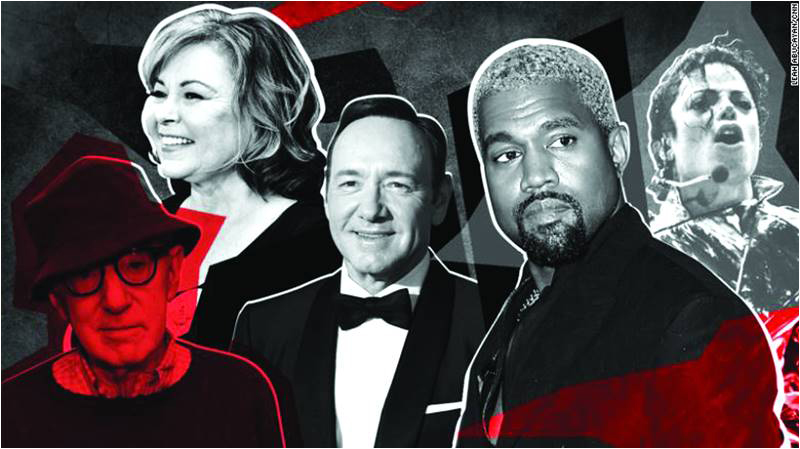
The response to Ellen DeGeneres hanging out with George W. Bush at a football game caught me slightly by surprise. It wasn’t the fact of their meeting. Frankly I’ve always suspected that wealthy, well-connected people only hang out with other wealthy, well-connected people at parties to which neither you nor I are invited. No, what surprised me was the speed with which cancel culture woke up from its power nap to begin circling a woman who has made a brand out of “kindness”, a brand particularly poignant since she got so much hate for coming out as a lesbian when she did. What also surprised me was that despite my affection for her, I, too, wanted to cancel Ellen.
To be fair, her defense addressing the backlash on her show was disappointingly tone deaf. Essentially reframing George Bush’s deplorable presidency and war crimes as a mere difference of opinion, she pivoted to how she has many “friends” with which she “doesn’t agree.” It was a point parroted by unintelligent celebrities for weeks after in her support, which only fueled the perception that the rich and famous don’t relate to the rest of the world at all. (One imagines the rich think that’s the point.)
Considered seriously, her response was maddening because someone billed as being an “other” was using her enormous privilege as self defense: he wasn’t a problem because he wasn’t a problem for her.
She was wrong because Bush is not a simply that racist uncle at the dinner table who says embarrassing things. He is responsible for some of the worst geopolitical disasters in the last half century. As a recipient of much of the suspicion that he institutionalized in the US, I felt personally disappointed that a woman I admired would chose to defend Bush rather than just acknowledge why people might feel upset. It felt like a betrayal, a realignment in which she declared her allegiance to white privilege over universal decency. Conversely, people coming for Bush so aggressively after no one did so during his presidency makes me think they’re actually angry at Trump and just want a (deserving) scapegoat.
And yet, isn’t that too much to put on a chance encounter at a football game? Not in the age of cancel culture, a movement so voracious that there is a new meal every week. Weinstein sure but also in various degrees: Woody Allen, Kanye West, Kevin Spacey, Roseanne Barr, Taylor Swift, Kevin Hart, et al. You’ll notice most of these are entertainment figures, and it makes sense that they’d be most vulnerable to cancel culture because their power depends on their fans buying their products. But how do you cancel Michael Jackson’s legacy over his alleged pedophilia? Or a President? Or a military dictator?
Part of the attraction of cancel culture is that it feeds the internet’s need for immediate justice in real time without the cumbersome legal procedures that have been around so long that most people know how to circumnavigate them anyway, particularly if they’re rich and famous. But you can’t outrun online mob hate. At least not yet. An errant tweet, a snide aside, the smallest recorded evidence of your betrayal to an as yet undefined larger cause can mobilize a faceless army to get your life’s work upended in minutes. And although slightly counter-intuitive, there is also a curious overlap between cancel culture and political correctness. Both allow people to obfuscate outrage in neutrality. “I’m not homophobic or racist, I’m just pro-free speech” sounds an awful lot like totalitarian outrage of cancel activists that claim sole arbitration when it comes to the social crimes of celebrities.

Let’s get one things clear: we would all be canceled. All of us have said or done things that we would be horrified for the internet to know. But that doesn’t mean that cancel culture is useless or fundamentally toxic. It may be unpredictable, and awed by its own power, but, like Amazon reviews where we are coming to a collective opinion, it can provide context, perspective and a voice from that 99% of the world not invited to the room. It gives some voice to all those who are invested in the idea that the rich and powerful not be allowed to be the only ones who get to write the narrative. We decide, we denounce, we matter.
I’ve seen cancel culture take off clumsily on social media in Pakistan, but I think that has more to do with a quickly disintegrating echo chamber subconsciously searching for targets as substitutes for the ones that are too powerful for them to get to, much like with Bush over Trump. After all, how do you cancel a coup d’etat or gang rapes or institutionalized corruption?
You can’t cancel anything unless a critical mass agrees it’s bad, which they simply don’t in Pakistan for most things (except Malala). The cynic in me knows that it is unlikely to change. The optimist in me frankly just wants to get invited to the parties with Bush and Ellen, begging the question: how does one cancel oneself?
Write to thekantawala@gmail.com
To be fair, her defense addressing the backlash on her show was disappointingly tone deaf. Essentially reframing George Bush’s deplorable presidency and war crimes as a mere difference of opinion, she pivoted to how she has many “friends” with which she “doesn’t agree.” It was a point parroted by unintelligent celebrities for weeks after in her support, which only fueled the perception that the rich and famous don’t relate to the rest of the world at all. (One imagines the rich think that’s the point.)
Considered seriously, her response was maddening because someone billed as being an “other” was using her enormous privilege as self defense: he wasn’t a problem because he wasn’t a problem for her.
I’ve seen cancel culture take off clumsily on social media in Pakistan, but I think that has more to do with a quickly disintegrating echo chamber subconsciously searching for targets as substitutes for the ones that are too powerful for them to get to
She was wrong because Bush is not a simply that racist uncle at the dinner table who says embarrassing things. He is responsible for some of the worst geopolitical disasters in the last half century. As a recipient of much of the suspicion that he institutionalized in the US, I felt personally disappointed that a woman I admired would chose to defend Bush rather than just acknowledge why people might feel upset. It felt like a betrayal, a realignment in which she declared her allegiance to white privilege over universal decency. Conversely, people coming for Bush so aggressively after no one did so during his presidency makes me think they’re actually angry at Trump and just want a (deserving) scapegoat.
And yet, isn’t that too much to put on a chance encounter at a football game? Not in the age of cancel culture, a movement so voracious that there is a new meal every week. Weinstein sure but also in various degrees: Woody Allen, Kanye West, Kevin Spacey, Roseanne Barr, Taylor Swift, Kevin Hart, et al. You’ll notice most of these are entertainment figures, and it makes sense that they’d be most vulnerable to cancel culture because their power depends on their fans buying their products. But how do you cancel Michael Jackson’s legacy over his alleged pedophilia? Or a President? Or a military dictator?
Part of the attraction of cancel culture is that it feeds the internet’s need for immediate justice in real time without the cumbersome legal procedures that have been around so long that most people know how to circumnavigate them anyway, particularly if they’re rich and famous. But you can’t outrun online mob hate. At least not yet. An errant tweet, a snide aside, the smallest recorded evidence of your betrayal to an as yet undefined larger cause can mobilize a faceless army to get your life’s work upended in minutes. And although slightly counter-intuitive, there is also a curious overlap between cancel culture and political correctness. Both allow people to obfuscate outrage in neutrality. “I’m not homophobic or racist, I’m just pro-free speech” sounds an awful lot like totalitarian outrage of cancel activists that claim sole arbitration when it comes to the social crimes of celebrities.

Let’s get one things clear: we would all be canceled. All of us have said or done things that we would be horrified for the internet to know. But that doesn’t mean that cancel culture is useless or fundamentally toxic. It may be unpredictable, and awed by its own power, but, like Amazon reviews where we are coming to a collective opinion, it can provide context, perspective and a voice from that 99% of the world not invited to the room. It gives some voice to all those who are invested in the idea that the rich and powerful not be allowed to be the only ones who get to write the narrative. We decide, we denounce, we matter.
I’ve seen cancel culture take off clumsily on social media in Pakistan, but I think that has more to do with a quickly disintegrating echo chamber subconsciously searching for targets as substitutes for the ones that are too powerful for them to get to, much like with Bush over Trump. After all, how do you cancel a coup d’etat or gang rapes or institutionalized corruption?
You can’t cancel anything unless a critical mass agrees it’s bad, which they simply don’t in Pakistan for most things (except Malala). The cynic in me knows that it is unlikely to change. The optimist in me frankly just wants to get invited to the parties with Bush and Ellen, begging the question: how does one cancel oneself?
Write to thekantawala@gmail.com

